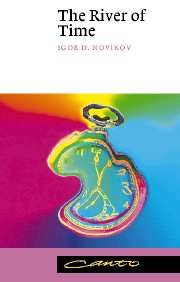Book contents
- Frontmatter
- Contents
- Preface to the Russian edition
- Preface to the English edition
- 1 Origins of thinking about time
- 2 Science of time is born
- 3 Light
- 4 The pace of time can be slowed down!
- 5 Time machine
- 6 Time, space and gravitation
- 7 Holes in space and time
- 8 Energy extracted from black holes
- 9 Towards the sources of the river of time
- 10 Journey to unusual depths
- 11 Grand Unification
- 12 Sources
- 13 What produces the flow of time and why in a single direction only?
- 14 Against the flow
- 15 Can we change the past?
- Conclusion
- Name index
- Subject index
11 - Grand Unification
Published online by Cambridge University Press: 04 May 2010
- Frontmatter
- Contents
- Preface to the Russian edition
- Preface to the English edition
- 1 Origins of thinking about time
- 2 Science of time is born
- 3 Light
- 4 The pace of time can be slowed down!
- 5 Time machine
- 6 Time, space and gravitation
- 7 Holes in space and time
- 8 Energy extracted from black holes
- 9 Towards the sources of the river of time
- 10 Journey to unusual depths
- 11 Grand Unification
- 12 Sources
- 13 What produces the flow of time and why in a single direction only?
- 14 Against the flow
- 15 Can we change the past?
- Conclusion
- Name index
- Subject index
Summary
When we were discussing the vacuum - the emptiness - in the chapter on ‘Energy extracted from black holes’, we emphasized that virtual particles are constantly created and annihilated in it. The emptiness proved to be a complex entity. The vacuum is a very complicated state of ‘boiling’ virtual particles of most different species.
The reader may not be too surprised by the statement that the properties of this state - the vacuum - depend on the recipe of its preparation. This implies that different vacua are possible; different types of emptiness!
In what follows, we will see examples of possible vacua. Now we will try to answer the following question: can the activity of the vacuum (its ‘boiling’) result in the formation of some energy density owing to the interaction of virtual particles?
Energy density can indeed appear. Zeldovich emphasized this fact in the 1960s. Each energy corresponds to a certain mass. Therefore, mass density will arise together with vacuum energy density. The reader may ask here: does it mean that some sort of universal medium, a new ‘ether’ is emerging in our notions? If this is true, such a medium can restore the concept of absolute rest and absolute motion. Indeed, the motion relative to this medium would be the motion with respect to the emptiness, in other words, with respect to the absolute space. It may seem that if we move relative to this new ‘ether’, we should feel the flow going against us, the ‘ether wind’ blowing in our face.
- Type
- Chapter
- Information
- The River of Time , pp. 173 - 188Publisher: Cambridge University PressPrint publication year: 2001



